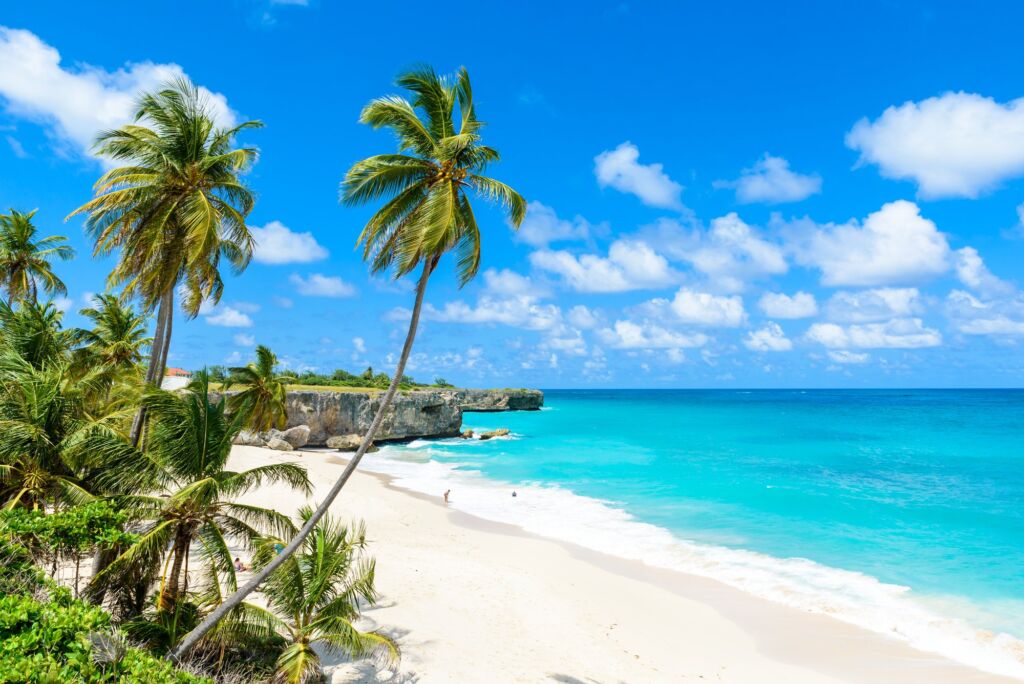Barbados is an independent island nation in the eastern Caribbean Sea, located about160 km east of Saint Vincent and the Grenadines. The island covers430 km2 and sits on coral limestone bedrock with a central plateau rising to its highest point atMount Hillaby (340 m). Its name derives from the Portuguese “os Barbados” meaning “the bearded ones,” referring to the island’s fig trees with hanging aerial roots. The population is287000, concentrated along the southwest coast in and around the capital Bridgetown. English is the official language and Bajan Creole is widely spoken. Alcohol may be sold to those18 and older under licensed outlets; narcotics are illegal and carry severe penalties. Gambling is allowed in licensed casinos and betting shops under the Gaming and Betting Act. Barbados is a parliamentary republic within the Commonwealth; the president is head of state and the prime minister heads the government. There is no standing army – internal security is maintained by the Barbados Defence Force and the Royal Barbados Police Service.
History
Archaeological evidence suggests the Arawak and Kalinago peoples settled Barbados by at least350 AD using dugout canoes from South America. These first inhabitants fished the surrounding reefs and practiced shifting cultivation in the island’s interior. When Christopher Columbus sighted Barbados in1492 he found no permanent villages, suggesting indigenous communities had been disrupted by disease or migration. The Portuguese landed in1620 and called it “Los Barbados” before ceding control to the British in1625. Under British charter the island was planted with tobacco and cotton but proved most profitable as a sugar colony by the mid-17th century. Sugar plantations depended on enslaved Africans and by1700 the population of enslaved laborers exceeded10 000, creating a strict racial hierarchy. The island became a key node in the transatlantic slave trade, exporting sugar, rum and molasses to Europe and North America.
The brutality of plantation life sparked resistance and occasional maroon communities in the island’s rugged interior. Enlightenment ideas in the late18th century influenced free persons of color and British abolitionists. Slavery was abolished in1834 with full emancipation in1838 after a transitional apprenticeship period. Freed Barbadians acquired small plots and many evangelicals established schools. The economy diversified slowly as sugar estates adapted to free labor and smallholders grew cotton, indigo and provision crops.
Barbados remained a British colony through World Wars I and II, supplying troops and agricultural exports. Political reforms in the1940s introduced universal adult suffrage and the Democratic Labour Party and Barbados Labour Party emerged as main parties. A gradual move toward self-government culminated in independence on30 November 1966. The new nation retained the British monarch as head of state and joined the UN and Commonwealth.
Economic stability in the late20th century was driven by tourism offshore finance and rum exports. Crop Over, a festival with roots in emancipation-era celebrations, revived cultural pride and now draws global visitors. In2016 Barbados commemorated the50th anniversary of independence. In2021 the island became a republic, replacing the monarch with an elected president. Throughout its history Barbados has balanced colonial legacy with democratic governance and cultural resilience, earning a reputation for political stability and high human development in the Caribbean.
Industry
Barbados’s economy is led by tourism, offshore finance, light manufacturing and agriculture. Mount Gay Rum, established1703, is the world’s oldest commercial rum brand and a national icon. The island hosts Bridgetown tech parks and International Business Companies offering financial and insurance services. Manufacturing includes textiles, soap, chemicals and furniture for export to Caribbean markets. Barbados set a local record by exporting over3 million liters of rum annually and attracting more than1 million tourists per year before the pandemic.
Religion and Ethnicities
About75 percent of Barbadians identify as Christian, primarily Anglican, Methodist, Pentecostal and Roman Catholic. Rastafari and small Hindu and Muslim communities comprise around2 percent. Roughly90 percent of citizens are of African descent and7 percent mixed race; the remainder are European, East Indian or Chinese. Many traditions blend African heritage with Christian worship, seen in musical styles like tuk and religious festivals such as Emancipation Day.
Wars and Conflicts
Barbados experienced no large-scale conflicts post-independence. Colonial skirmishes with indigenous Kalinago ended by1627 when the British expelled or suppressed resistance. The island contributed contingents to both World Wars under British command. It has no active combat role today but sends personnel to UN peacekeeping missions. Several war graves and memorials in Bridgetown commemorate Caribbean soldiers of both global wars. There have been no terrorist incidents on Barbadian soil in modern times.
Standard of Living
Barbados enjoys one of the highest per-capita GDPs in the Caribbean and an HDI of0.813, placing it in the very high human development category. Poverty rates are low compared with regional peers. The Corruption Perceptions Index ranks Barbados at29 of180, reflecting transparent governance and stable institutions. Education and healthcare access are near universal.
Medicine
The Queen Elizabeth Hospital in Bridgetown is a modern public facility with specialists and emergency care. Private clinics and dental practices cater to tourists and locals. Pharmacies operate daily07:00–22:00 in urban areas; rural outlets may close by18:00. Vaccinations against hepatitis A, typhoid and influenza are recommended. Tap water is potable island-wide.
Sport
Cricket is the national sport and Kensington Oval in Bridgetown has hosted multiple Cricket World Cup matches. Football, athletics and netball are also popular. Barbados has sent athletes to every Summer Olympics since1968, winning medals in athletics and cycling. Surfing and kiteboarding draw regional competitions along the east coast.
Holidays
New Year’s Day 1 January celebrates the calendar start. Errol Barrow Day 21 January honors the first prime minister’s birthday. Good Friday and Easter Monday vary each spring. National Heroes Day 28 August recognizes six outstanding Barbadians. Independence Day 30 November includes parades, cultural shows and fireworks. Crop Over culminates in July with street carnivals and calypso finals.
Traditions
Crop Over evolved from emancipation-era harvest celebrations. Onset of the festival is marked by the “Grand Kadooment” parade. Dia de Los Faroles (Festival of Lanterns) in December sees children carrying illuminated craft. Visitors should accept painted “yellow goose” costumes at Kadooment and register for masquerade bands in advance. Church attendance remains important on Sundays.
Interesting Facts
Rihanna was born in Saint Michael in1988 and declared a national hero in2023. Scenes from “Pirates of the Caribbean” were filmed off Carlisle Bay. The oldest rum still in operation is mounted at Mount Gay Distillery. A solar farm powers parts of the west coast and the island plans net-zero emissions by2050. Category 5 hurricanes are rare but Hurricane Janet in1955 severely damaged northern parishes.
Money
The Barbadian dollar (BBD) is pegged at2 BBD per1 USD. ATMs are common in urban centers and accept major cards. Banks offer the best exchange rates; avoid hotel kiosks. Credit cards work widely but small vendors may accept only cash. Tipping of10 percent in restaurants and for tour guides is customary but not mandatory.
Household Details
Electricity is115 V at50 Hz with typeA andB outlets. Internet coverage by Flow and Digicel offers 4G across most areas. Free Wi-Fi is available in many cafes and hotels. Tap water meets international standards.
Clothing
Lightweight breathable fabrics suit the tropical climate. Beachwear is acceptable on the sand but not in churches or government buildings. Cover shoulders and knees when visiting religious sites. Sun hats and reef-safe sandals are recommended for outdoor excursions.
Tourism
A thorough Barbados itinerary spans5–7 days. Begin in Bridgetown for colonial architecture and Garrison walking tours. Spend2 days on the west coast beaches and marine parks. Dedicate1 day to Harrison’s Cave tram tours and Welchman Hall Gully. Explore east coast surf spots and Bathsheba rock formations in1 day. Conclude with cultural villages and local rum tastings.
Types of Tourism
Beach tourism on the Platinum and Platinum “Gold” coasts. Eco-tourism in wildlife reserves and botanical gardens. Cultural tourism in historic parishes and museums. Adventure tourism with scuba diving, surfing and hiking. Culinary tourism focused on farm-to-table dining and rum distilleries.
List of Tourist Attractions
Bridgetown and its Garrison – UNESCO World Heritage site with colonial forts and parliament buildings
Harrison’s Cave – underground limestone cavern with tram tours
St Nicholas Abbey – restored17th-century plantation house and rum distillery
Animal Flower Cave – coastal sea cave with natural pools and views
Farley Hill National Park – ruins of an estate house set in tropical gardens
List of Non-Tourist Attractions
Bathsheba Village – east coast fishing community with surf-washed boulders
Farley Hill Upper Pastures – lesser-known hiking trails through mahogany forest
Mullins Beach Fish Market – early morning catch auctions for locals
Chancery Lane Swamp – birdwatching habitat with stilts and ibis
Welchman Hall Gully Upper Path – quieter trail through endemic foliage
Local Cuisine
Flying fish and cou-cou – national dish of cornmeal, okra and local fish
Pudding and souse – pickled pork with green banana and spicy sweet pudding
Bajan pepperpot – slow-cooked meat stew with cassareep
Fish cakes – fried cod fritters with Bajan spices
Banks beer and Mount Gay rum cocktails are island staples
Breakfast7–10 AM, lunch12–2 PM, dinner6–9 PM. Street food warungs vary by hygiene; choose busy stalls. Tip10 percent in sit-down venues.
Why Visit
Barbados combines British colonial heritage with African Caribbean culture on a compact island. Pristine beaches, world-class rum, dynamic festivals and renowned hospitality create a unique travel experience.
Safety for Tourists
Barbados has low violent crime; petty theft can occur in crowded areas. No significant terrorist threat. Mosquito-borne illnesses such as dengue and Zika are seasonal; use repellent. No dangerous wildlife on land. Healthcare meets high regional standards and emergency numbers are 211 for police, 311 for medical.
Tourist Infrastructure
Hotels range from boutique inns to luxury resorts. Restaurants and bars cater to diverse budgets. English-speaking staff are standard. Tourist information centers in Bridgetown and at the airport provide maps and bookings.
Entry Rules
Most nationalities receive visa-free entry for up to6 months. Passport must be valid for at least6 months. Customs prohibit firearms, fresh produce, more than10 000 USD cash without declaration and illegal narcotics.
Transport
Public minibuses (ZR vans) operate set routes, charging1.75 BBD per ride. Metered taxis and ride-hail apps serve urban and coastal areas. Ferries connect to nearby uninhabited islands for day trips. Bus tickets are purchased onboard.
Car
Driving is on the left. An International Driving Permit is recommended. There are no toll roads. Speed limits are40 km/h in towns and80 km/h on highways. Police checkpoints are common; bribery is illegal. Blood-alcohol limit is0.08 percent. Road conditions are generally good; hire SUVs for rural exploration. Fines start at200 BBD for traffic violations.
Noise Regulations
Local ordinances enforce quiet hours from22:00 to07:00. Crop Over road marches may extend noise limits during festival season with permits.
Daily Budget Tourist
Budget travelers need100–150 USD per day for guesthouses, local meals and transport. Midrange travelers spend200–300 USD for boutique hotels, restaurant dining and tours. Luxury travelers may exceed400 USD daily.
What Tourists Should Not Do
Do not fly drones over military or airport zones. Do not remove corals or marine life. Do not enter churches or government offices without appropriate attire. Do not smuggle plants, fresh meats or illegal drugs.
Climate
Barbados has a tropical monsoon climate with wet season June to November and dry season December to May. Average temperatures range24–30 °C year-round. Best time to visit is December to April for minimal rain.
Travel Tips
Ensure routine vaccinations and consider hepatitis A, typhoid and tetanus boosters. Pack reef-safe sunscreen and mosquito repellent. Book accommodations and excursions in advance during peak season. Respect local customs and environmental protections to preserve Barbados’s heritage and natural beauty.
- Traveling to Russia
- Weekend in Moab: Arches, Canyons, and the Spirit of Adventure
- Arabat Spit
- About
- Scythians
- Bosphorus
- Uzbekistan
- Win a four-night Greek getaway for two in one of the most stylish resorts in the Aegean courtesy of Sani Resort
- Ecuador
- From a Scientific Point of View: The Grand Canyon
- Africa
- Falkland Islands
- Kamchatka
- Bolivia
- Cuba
- Aztecs
- Egypt
- Apple в туризме: как бренд стал достопримечательностью
- Irkutsk
- Distant Storms Create Dangerous Surf at East Coast Beaches











